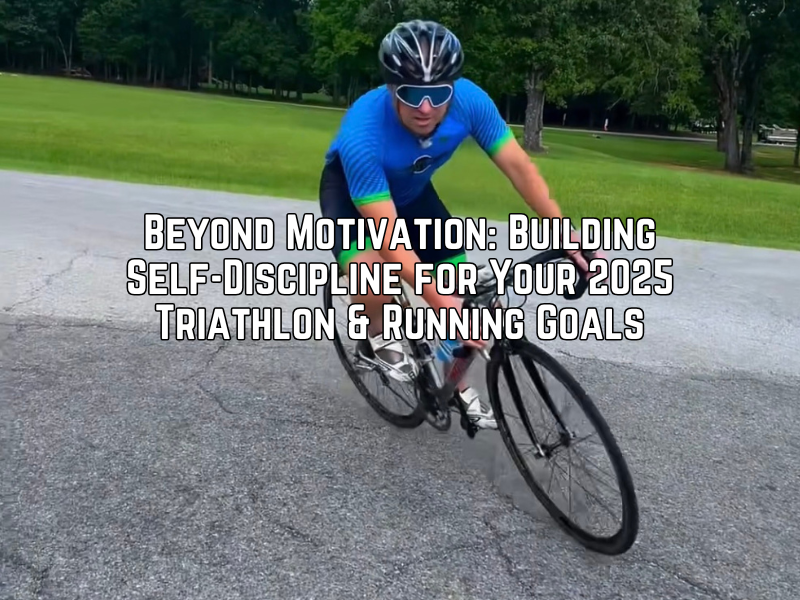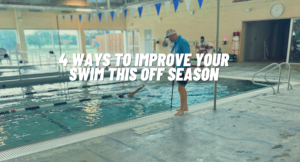
Beyond Motivation: Building Self-Discipline for Your 2025 Triathlon & Running Goals
With the new year 2025 underway, many people have great intentions with setting goals to improve their health and wellness. The Mayo Clinic recommends adults aim for 150 minutes of cardiovascular exercise per week. If you spread this across 6 days, that is just 25 minutes per day. This would cause many of our competitive marathoners and Ironman triathletes to detrain. However, this is not always the case, as many of these athletes do struggle with balance and consistency. We get it though – life gets busy. You have work deadlines, your kids get sick, and soccer games are on Saturdays.
Here are some practical tips that I use and you can use to stay consistent:
SMART Goals
Many of you probably have heard of SMART (specific, measurable, attainable, relevant, time-bound). Having goals is important because it helps keeps your purpose of doing this in the forethought of your mind.
Specific goals will have more depth than “I just want to finish an Ironman.” To be more specific, you could say, “I want to finish in under 13 hours.”
Then your goals need to be measurable. You can set specific times you want to finish in, such as swimming in under 90 minutes, biking under 6.5 hours, and running the marathon in under 5 hours. To reach these, you can add that you need to swim a minimum of 4 days per week, bike 5 days per week, and run 3 times per week. You could also include any limiters you need to work on, such as improving your muscular endurance in swimming, getting a bike fit and working on your flexibility, and improving your run cadence.
Next, your goals should be attainable. If you’re new to triathlons or you’re nowhere close to being able to go under 13 hours in an Ironman, then you need to adjust that goal. It might be to finish under the cutoff, which is totally cool as the day itself will be plenty challenging.
Next, your goal should be relevant. If you want to do this Ironman, then training like a CrossFitter or bodybuilder isn’t as relevant as Ironman training.
Finally, you need to put a date that you want to be ready by. If you’re using a triathlon coach, be sure to discuss with them first on a timeline for you. If it’s your first one, depending on your experience, it could take you 6 months to a couple of years to be ready. The Ironman is a huge undertaking.
While some goals may be daunting, you should share your goals with your spouse, close friends, mentors, and coaches. These people are more likely to have an interest in you achieving your goals, and it will help hold you accountable to them. Put your goals where you can see them, such as on your bathroom mirror or in front of you at your office.
Start Small
If you’re just getting into running or you’ve only been running two times per week, don’t just jump into 6 days a week of running or do a marathon this year. Instead, simply add a third day in. If you are wanting to train for an Ironman but you’ve only been training 6 hours per week, then doubling that immediately will cause too much strain. Ramping up too fast too soon can lead to injury and burning out. You want to be doing this for the rest of your life.
Also, you can find small positive habit training changes you can make. Create a new habit once a month. If you’ve been struggling to fit in strength training, then just add 5-10 minutes of simple bodyweight exercises that you can fit in after your run or on your lunch break every other day. If you need to add more vegetables to your plate, then add an extra serving for lunch or dinner (without the added dressing – that will get you). If you struggle winding down at night and getting quality sleep, then aim to get off your screens an hour or two before bed and replace it with reading a book instead.
These are suggested small changes that you can aim to fit in around your daily life. They’re not always easy as your motivation will always come and go. It’s your self-discipline that will help sustain you.
Have a Plan
If you treat your training as something you’ll get around to if you get time, then you will never find the time. You need to plan it around your day. Use a daily planner and make an appointment with yourself that you’re going to be in the pool by 6:00 a.m. If you have it written down or on your Google Calendar, then you’re more likely to actually stick with you training.
Be Proactive
Being proactive saves you time and reduces last-minute idling in the mornings. If you see you have a bike ride in the morning, then that evening you should lay out your cycling apparel and water bottles, and have any technology ready to be fired up in the morning. You could also have your post-workout nutrition ready to be served as soon as you’re done to get your recovery process started.
I hope these tips provided value or reminders to you that you can be consistent this year in your own training. Setting goals is a big first step, but then having a plan for how you will work towards your goal each day, by starting with small habits that you can build into your daily life, then being proactive to be ready for the following day or session. Notice that I didn’t mention motivation? That’s right – your motivation is going to fade, and it will probably fade by mid-February or March if you set a January 1st goal. However, it’s these habits, planning, and others we didn’t cover, also known as self-discipline, that will help you reach your goals. Whether you want to do the Ironman triathlon or if you’re going from the couch to 5K, it’s your self-discipline that will carry you through. Who’s ready to get disciplined and have an epic 2025? I know I am.



